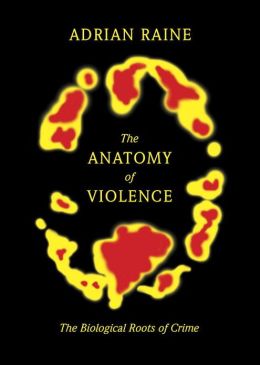Sunday, May 5th, 2013
The release of the new book The Anatomy of Violence: The Biological Roots of Crime by University of Pennsylvania neurocriminologist Adrian Raine has sparked a wave of media coverage of issues at the heart of ponerology.
Our last post focused on Raine’s essay “The Criminal Mind,” featured in the April 27, 2013 Wall Street Journal, in which he discussed how advances in our understanding of the genetic, neurological and environmental bases of violence are influencing our view of and approach to crime.
Now another large media outlet, CNN, has run not one, but two segments featuring Raine’s work. (more…)
Tags: adrian raine, amygdala, boston marathon bombings, boxing, brain tumors, cavum septum pellucidum, cnn, fetal alcohol syndrome, frontal lobes, jake tapper, limbic system, neurocriminology, neuroscience, psychopathy, rocky, sanjay gupta, septum pellucidum, the anatomy of violence, the lead with jake tapper, tsarnaev brothers, violence
Posted in Books, Crime, Television News | 1 Comment »
Saturday, April 27th, 2013
A couple of months ago, we shared a story about a pilot episode for a CBS television show based on the work of a very intriguing professor who works on issues at the heart of ponerology. That person is Adrian Raine, professor of criminology, psychiatry and psychology at the University of Pennsylvania.
Today’s Wall Street Journal features a sizeable piece by Raine as its “Saturday Essay.”
The title of the essay is “The Criminal Mind” and underneath the title it says “Advances in genetics and neuroscience are revolutionizing our understanding of violent behavior—as well as ideas about how to prevent and punish crime.”
It doesn’t get much more relevant to ponerology than that. And it’s heartening to see Raine given a platform to share his extremely important and provocative ideas in The Wall Street Journal just in advance of the release of his book The Anatomy of Violence: The Biological Roots of Crime.

Raine’s essay touches on: (more…)
Tags: adrian raine, aggression, amygdala, boston marathon bombings, criminology, genetics, legal system, neurocriminology, neuroscience, prefrontal cortex, the anatomy of violence, the wall street journal, tsarnaev brothers, violence
Posted in Books, Crime, Newspapers, Online News, Research | No Comments »
Sunday, February 24th, 2013
A few months back, I came across an incredibly compelling article by Sandy Hingston in Philly Mag. The title above the article’s copy is “The Psychopath Test,” but the HTML title that shows in the browser tab is much more descriptive of the provocative jist of the article.
It reads “Kids Can Be Psychopathic, Too.”
The article focuses heavily on – and introduced me to – the work of Adrian Raine, a professor of criminology, psychiatry and psychology on the faculty of the University of Pennsylvania’s Jerry Lee Center of Criminology.
Raine is the author of the textbook The Psychopathology of Crime: Criminal Behavior as a Clinical Disorder. And, as described in the article, he holds two highly controversial and enormously challenging beliefs:
- He believes that we will soon be able to use medical tests to determine whether a child is predisposed to grow up to be a psychopath.
- And he also believes that, once we are able to do that, we should screen children for traits linked to psychopathy.
The Philly Mag article itself is well worth the read, as it offers a fascinating look at:
- A brief historical overview of criminology and the nature vs. nature debate
- Structural and functional differences in the brains of psychopaths as opposed to those of non-psychopaths
- How psychopaths are responsible for crime at levels vastly disproportionate to their numbers
- What separates successful from unsuccessful psychopaths
- Genes influencing brain structure that are associated with antisocial and aggressive behavior
- Raine’s research showing certain differences among young children, which he believes are innate and biologically-based, that help predict which ones will exhibit future aggression and criminality
- Why, when it comes to the “chicken or egg” question regarding biological differences and psychopathy, Raine falls on the “biology as cause” side of the debate
- Why many resist biological explanations of “bad” behavior
- Interventions that might help children predisposed to criminal behavior
- Responses from others to Raine’s suggestion that we screen children for psychopathy-linked traits
I highly recommend taking the time to check it out.
But I bring up that article here in order to preface a new and exciting development regarding Adrian Raine that has come to my attention.
One other phenomenon that Hingston’s piece touches on is the recent explosion of media – including films (such as We Need to Talk About Kevin) and television shows (such as Dexter) – dealing with the subject of psychopathy. The article credits Raine’s investigations into the brains of criminals – neurocriminology research – for providing the platform for this explosion. If attributing this credit to Raine is appropriate then it is only fitting that his work will now serve as the basis for a television show in an even more direct manner. (more…)
Tags: adrian raine, alex cary, alex gansa, biology, brain scans, cbs, children, criminology, david harewood, dexter, homeland, howard gordon, jerry lee center of criminology, mark pellington, neurocriminology, philly mag, psychopathy, sandy hingston, screening, television, the anatomy of violence, the psychopath test, the psychopathology of crime, we need to talk about kevin
Posted in Books, Television Shows | No Comments »
